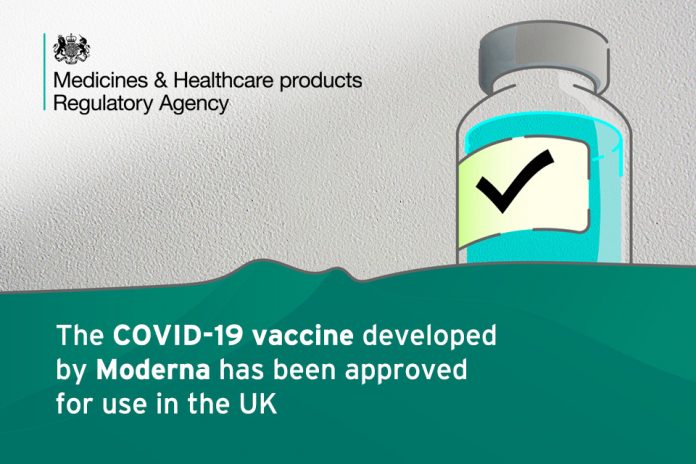The COVID-19 vaccine developed by Moderna has today been given regulatory approval for supply by the Medicines and Healthcare products Regulatory Agency (MHRA). This follows a thorough and rigorous assessment by the MHRA’s teams of scientists, including advice from the independent Commission on Human Medicines, which reviewed in depth all the data to ensure this vaccine meets the required standards of safety, quality and effectiveness.
This is the third COVID-19 vaccine to be approved for use by the MHRA and is the second mRNA vaccine (the Pfizer/BioNTech vaccine approved in December 2020 is also an mRNA vaccine).
MHRA Chief Executive Dr June Raine said:
Today’s approval brings more encouraging news to the public and the healthcare sector. Having a third COVID-19 vaccine approved for supply following a robust and thorough assessment of all the available data is an important goal to have achieved and I am proud that the agency has helped to make this a reality.
The progress we are now making for vaccines on the regulatory front, whilst not cutting any corners, is helping in our global fight against this disease and ultimately helping to save lives. I want to echo that our goal is always to put the protection of the public first.
Once in use, all COVID-19 vaccines are continually monitored by the MHRA. This ensures that the benefits in protecting people against COVID-19 continue to far outweigh any potential side-effects.
Meantime, even if you have had a vaccine it is vital that everyone follows the national lockdown restrictions and remembers ‘stay alert, protect the NHS and save lives’ at all times.
Professor Sir Munir Pirmohamed, Chair of the Expert Working Group of the Independent Commission on Human Medicines said:
We are delighted to be able to give a positive recommendation for the Moderna vaccine which will help in the roll-out of the COVID-19 vaccination programme.
As with all the COVID-19 vaccine data we have seen to date, we have ensured a robust and thorough safety assessment has been carried out with the independent experts that sit on this group.
Vaccine Background
This Moderna vaccine works by injecting a small part of the COVID-19 virus’ genetic code, which triggers an immune response and creates antibodies in the human body able to fight the virus. The dosage for this specific vaccine requires two doses to be given. It is recommended to administer the second dose 28 days after the first. It is approved for use in people 18 years and over, and it can be used by pregnant and breastfeeding women following a discussion with their healthcare provider on the benefits and risks. It can be stored at -20°C for up to six months.
The National Institute for Biological Standards and Control, part of the agency, is carrying out independent batch release on all of the approved vaccines, to ensure that every batch meets quality standards, and it will do so for the Moderna COVID-19 Vaccine.
In line with the other COVID-19 vaccines that have been approved, the Moderna vaccine should only be considered for use in pregnancy when the potential benefits outweigh any potential risks for the mother and baby. Women should discuss the benefits and risks of having the vaccine with their healthcare professional and reach a joint decision based on individual circumstances. Women who are breastfeeding can also be given the vaccine after a discussion with their healthcare professional.
Anyone with a previous history of allergic reactions to the ingredients of the vaccine should not receive it, but those with any other allergies such as a food allergy can have the vaccine.
Notes to Editor
- The Medicines and Healthcare products Regulatory Agency is responsible for regulating all medicines and medical devices in the UK by ensuring they work and are acceptably safe. All our work is underpinned by robust and fact-based judgements to ensure that the benefits justify any risks.
- The decision to approve the supply of this vaccine was taken under Regulation 174 of the Human Medicine Regulations 2012, which enables rapid temporary regulatory approvals to address significant public health issues such as a pandemic.
- The Medicines and Healthcare products Regulatory Agency (‘the agency’) has three centres. The MHRA, the National Institute for Biological Standards and Control (NIBSC) and the Clinical Practice Research Datalink (CPRD). The agency is an executive agency of the Department of Health and Social Care.
- The Commission on Human Medicines (CHM) advises ministers and the MHRA on the safety, efficacy and quality of medicinal products. The CHM is an advisory non-departmental public body, sponsored by the Department of Health and Social Care.







